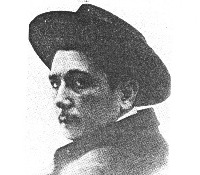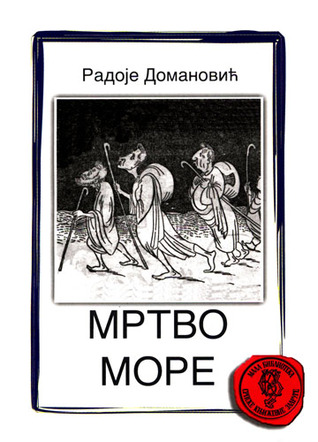
Radoje Domanović was a Serbian writer and teacher, most famous for his satirical short stories.
Domanović was born in a village Ovsište which is located in Topola municipality, Šumadija District. He attended a gymnasium in Kragujevac. Some of his teachers were Pera Đorđević and Sreten Stojković, followers of Svetozar Marković, who were arrested for an attempt to take control of the local government and displaying a red flag. From 1890 to 1894, Domanović studied at the history and philology department of Belgrade's Grande Ecole (what soon became the University of Belgrade). He read some of his first works to the members of a student organization Pobratimstvo (Bloodbrothers).
In 1893, he published his first work, a short story Na mesečini (In the Moonlight), in a magazine Javor. Two years later, he got his first tenure as a lecturer in a gymnasium in Pirot. There he met Jaša Prodanović, who was transferred to that school as a punishment. At that time, Domanović joined Republikanska stranka (The Republican Party), and got married to Natalija Ristić. He took an active part to maintain the doctrine of republicanism during the time of the monarchy, was threatened repeatedly not to criticize The Establishment. After nine months, he was transferred, as a punishment on request of his political rivals, to a gymnasium in Vranje. On the same count, after a year in Vranje, he was transferred to Leskovac. Following a critical speech on the position of teachers in 1898, he was dismissed from his post, along with his wife. As a response, he wrote a short story Ukidanje strasti (The Tearing of Passion).
In 1899, he published two collections of short stories and his famous story Danga, perhaps an inspiration for Yevgeny Zamyatin's We (novel). The following year, he got a well-paying, government job as a clerk in the State's Archives. In 1902, after he published Stradija, he was again dismissed from his post. He started writing editorials for magazine Odjek (Echo). After the coup in 1903, Domanović returned to his post, and soon got a stipend to work on his stories. It was rumoured that the coup saved his life, since he was on a list for liquidation of the old government. In 1904, he started a magazine Stradija, that had 35 editions. The following year, he was appointed to the State press. He died in 1908 of tuberculosis survived by his wife and two children Zoran and Danica.
It can be said that Domanović is the diminutive Serbian Swift, if we lend ourselves to compare our writers with foreign ones. During his short literary career he succeeded in developing the great powers of the satirical novel, although some of his stories are distorted by pessimism and grime.
Domanović lived for only 35 years and did not publish much, leaving some work in manuscript form. Some of his most famous stories are:
"Danga" (Mark), a story about the author's dream of visiting an imaginary country where all people blindly follow their leaders in a dystopian society. After all of the citizens were branded on the forehead, without complaints, the story culminates when the narrator proclaims that he, as a Serb, is much braver then anybody and requests to be branded ten times.
"Ukidanje strasti" (Abolishing Passion), a satirical fiction about a legislation that outlawed passion, after which people stopped doing things like smoking, drinking, or taking political participation.
"Razmišljanje jednog običnog srpskog vola" (Reasoning of an Ordinary Serbian Ox), criticizes Serbian misuse of their history and tradition.
"Kraljević Marko po drugi put među Srbima" (Marko Kraljević Among Serbs For the Second Time), a story of a return of an epic Serbian hero.
"Mrtvo more" (Dead Sea), a story about resistance of masses against any kind of progress.
"Vođa" (The Leader), a story about people who chose a person they never saw before to lead them to a better place. After suffering through a long trip, they realized that their leader was blind.







